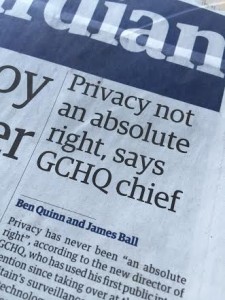This morning’s Observer column.
The company [Symantec] goes on to speculate that developing Regin took “months, if not years” and concludes that “capabilities and the level of resources behind Regin indicate that it is one of the main cyberespionage tools used by a nation state”.
Ah, but which nation states? Step forward the UK and the US and their fraternal Sigint agencies GCHQ and NSA. A while back, Edward Snowden revealed that the agencies had mounted hacking attacks on Belgacom, a Belgian phone and internet services provider, and on EU computer systems, but he did not say what kind of software was used in the attacks. Now we know: it was Regin, malware that disguises itself as legitimate Microsoft software and steals data from infected systems, which makes it an invaluable tool for intelligence agencies that wish to penetrate foreigners’ computer networks.
Quite right too, you may say. After all, the reason we have GCHQ is to spy on nasty foreigners. The agency was, don’t forget, originally an offshoot of Bletchley Park, whose mission was to spy on the Germans. So perhaps the news that the Belgians, despite the best efforts of Monty Python, are our friends – or that the UK is a member of the EU – had not yet reached Cheltenham?
